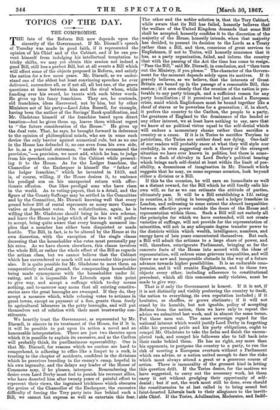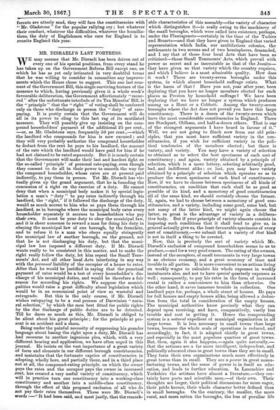TOPICS OF THE DAY.
THE COMPROMISE.
having been the author of the Savings' Bank qualification, and Mr. Gladstone himself of the franchise based upon direct taxation—but he gives them up, leaves them without regret to "the future consideration of the House." He gives up the dual vote. That, he says, he brought forward in deference to the opinion of philosophical minds, who see in some such device the only barrier against numerical rule, but as no one in the House has defended it, no one even from his own side, he is, as a practical statesman, "unable to recommend the provision,"—a provision, we must add, which he has, to judge from his speeches, condemned in the Cabinet while present- ing it to the House. As for the Lodger franchise, the Chancellor of the Exchequer is himself the "father of the lodger franchise," which he invented in 1859, and is, of course, willing, if the House desires it, to embrace his prodigal son on his unexpected return with affec- tionate effusion. One likes prodigal sons who have risen in the world. As to voting-papers, that is a detail, and the figure of the County Suffrage may be settled in the Committee and by the Committee, Mr. Disraeli knowing well that every pound below 20/. of rental represents so many more Conser- vative or dependent votes. On redistribution, again, he is willing that Mr. Gladstone should bring in his own scheme, and leave the House to judge which of the two it will prefer to accept, being quite aware that every borough menaced im- plies that a member has either been disquieted or made hostile. The Bill, in fact, is to be altered by the House at its own discretion, with the exception of the single clause decreeing that the householder who votes must personally pay his rates. As we have shown elsewhere, this clause involves the whole Bill, or rather the whole effect of the Bill as regards the artisan class, but we cannot believe that the Cabinet which has surrendered so much will not surrender this proviso also. It is quite possible for Mr. Gladstone to meet them on comparatively neutral ground, the compounding householder being made synonymous with the householder under 5/. rating, and it is impossible for Liberals upon this point to give way, and accept a suffrage which to-day means nothing, and to-morrow may mean that all existing constitu- encies save the great boroughs are swamped. If they do, they accept a measure which, while refusing votes to artisans in great towns, except on payment of a fine, grants them freely to agricultural labourers in the petty boroughs, and will put themselves out of relation with their most trustworthy con- stituents. •
We heartily trust the Government, as represented by Mr. Disraeli, is sincere in its treatment of the House, for if it is, it will be possible to put upon its action a novel and an honourable interpretation. There are just two theories upon which it is possible to explain its excessive, and as the Carlton will probably think, its pusillanimous squeezability. One is that Mr. Disraeli, for reasons which we confess are hard to comprehend, is adhering to office like a limpet to a rock, is trusting to the chapter of accidents, confident in the divisions which he perceives breeding in the enemy's camp, hopeful in his own ingenuity, and the delays any leader of the House of Commons may, if he pleases, interpose. Remembering the desire even Lord Derby must feel to punish his recreant allies, who have deserted him after twenty years of painful effort to represent their views, the ingrained trickiness which obscures the genius of the Chancellor of the Exchequer, the excessive difficulty of forcing the Tory party into line behind such a Bill, we cannot but express as well as entertain this fear.
The other and the nobler solution is, that the Tory Cabinet, while aware that its Bill has failed, honestly believes that the welfare of the United Kingdom demands that some Bilk shall be accepted, honestly confides it to the discretion of the majority of the House, honestly intends, when that majority has decided, to present its decision to the Lords as a Treaty rather than a Bill, and then, conscious of great services to Englishmen, if not to Tories, will honestly announce that it
has, as a party organization, failed, and inform the country that with the passing of the Act the time has come to resign.. "Pass the Bill," said Mr. Disraeli, in conclusion, and "then turn, out the Ministry, if you please." The character of the Govern- ment for the moment depends solely upon its motives. If it gravely believes, as we believe, that the interests of Great Britain are bound up in the passage of a reasonable Bill, this- session ; if it sees clearly that the reunion of the nation is pre- ferable to any party triumph, and a sufficient reason for any party humiliation' if it perceives but just ahead a European: crisis, amid which Englishmen must be bound together like a sheaf of staves or be powerless for a generation ; if, in short, it prefers the country to the Carlton, the people to a party, the greatness of England to the dominance of the landed or any other interest, we at least have nothing to say, save that we know of no political virtue equal to the self-denial which will endure a momentary shame rather than sacrifice a country or a cause. If it is in Tories to sacrifice Toryism to. patriotism, the Tories are neither dead nor dying. One-half of our readers will probably sneer at what they will style our- credulity, in even suggesting such a theory of the strangest situation we have ever known in politics, but there is some- times a flash of chivalry in Lord Derby's political bearing which brings such self-denial at least within the limit of pos- sibility, a dreaminess of imagination in Mr. Disraeli which suggests that he may, on some supreme occasion, look beyond either a division or a Bill.
If this be the occasion, he will earn an immediate as well as a distant reward, for the Bill which he still fondly calls his. ownwill, so far as we can estimate the attitude of parties,. ultimately pass. It will be a Bill establishing a 12/. rating- in counties, a 5/. rating in boroughs, and a lodger franchise in London, and redressing to some extent the absurd inequalities between effective power outside the doors of the House and . representation within them. Such a Bill will not embody all the principles for which we have contended, will not create, varieties of suffrage, will not provide for the representation of minorities, will not in any adequate degree transfer power to the districts within which wealth, intelligence, numbers, and energy have of late years concentrated themselves. But such. a Bill will admit the artisans to a large share of power, and will, therefore, reinvigorate Parliament, bringing so far the concrete facts of the House into accord with the ideas of' representation, will redress some grievous inequalities, and will throw no new and insuperable obstacle in the way of a future advance towards higher possibilities. It is an endurable com- promise, and it will reunite Englishmen, and to those two objects every other, including adherence to constitutional precedent, which all this concession sadly violates, must be made to give way.
That is if only the Government is honest. If it is not, if it is not distinctly and visibly preferring the country to itself, the nation to everything, its own reputation included ; if it . hesitates, or shuffles, or grows obstinate ; if it will not stand by its humble, but not ignoble, policy of accepting Reform from the nation, then we have only to repeat the advice we submitted last week, and in almost the same terms.. Put these men out. The same sovereign regard for the national interest which would justify Lord Derby in forgetting alike his personal pride and his party obligations, ought to compel Mr. Gladstone to take the helm and finish the uncom- pleted task, and compel his followers also to fall back into their ranks behind them. He has no right, any more than his opponents, to postpone the country to a party, to run the risk of meeting a European overturn without a Parliament which can advise, or a nation united enough to dare the risks which must always attend a great or a generous course of' action. There is immorality of the grossest kind in letting this question drift. If the Tories desire, for the motives we have suggested, to carry out the necessary work, let them carry it out without grudging their opportunity of self- denial ; but if not, the work must still be done, even should the constituencies be at last called in to bring sound but faint-hearted Liberals back to their allegiance to the inevit- able Chief. If the Tories, Adullamites, Moderates, and Indif-
lerents are utterly mad, they will face the constituencies with Mr. Gladstone" for the popular rallying cry ; but whatever their conduct, whatever the difficulties, whatever the humilia- tions, the duty of Englishmen who care for England is to _reunite England this year.



































 Previous page
Previous page